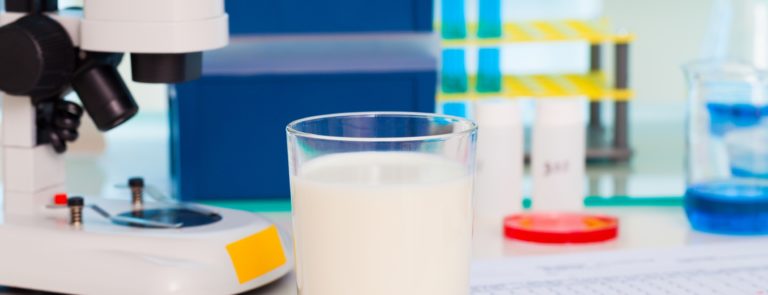20% off €40
Lab milk Q&A: The lowdown on the new animal-free dairy

What is lab milk? And who is it suitable for? We answer some of the big questions around this emerging form of animal-free dairy.
What is dairy-free milk?
Dairy isn’t for everybody. Between 1 and 2 in every ten people have lactose intolerance in the UK.
It’s more common in countries and places where milk isn’t a big part of the average adult diet, including Africa, Asia and South America.1
Dairy intolerance and allergies are why we now have so many kinds of milk to choose from at the supermarket, as well as people ditching cow’s milk and going vegan.
There is plenty of nut and plant-based milk on the market.
Yes, they’re great alternatives to cows’ milk for vegans, people with lactose intolerance or dairy allergies, but let’s be honest, they’re not always direct substitutes for dairy for some people.
The tastes, textures, consistencies, and nutritional contents of dairy-free products can be very different. This is due to the absence of two proteins – casein and whey.
However, thanks to the wonder of science, there are now companies concocting these two missing dairy proteins synthetically in the lab.
This is leading to animal-free dairy products that are a much closer match to those made with cows’ milk.
8 dairy-free milk alternatives + their main benefits
Before we get into lab-grown milk, here are some of the most common dairy-free milks out there and what each type is good for:
| Type of dairy-free milk | What it's good for |
|---|---|
|
Super creamy oats, hot drinks and cereal, it’s one of the best-tasting plant milks out there. |
|
With more protein than cow’s milk per 100ml, soya milk is a great and nutritionally similar choice for replacing dairy milk. The ‘barista’ soy varieties are usually the best dairy free milks for coffee. |
|
Almond milk is naturally sweet and low in calories. It’s great for cereals and smoothies, providing the taste with fewer calories. |
|
Pea milk may sound a bit weird. It may sound a bit more acceptable when we tell you that it’s not your regular garden peas that are used to make pea milk. It’s full of protein and other plant nutrients. |
|
Cashew milk is delicious, and a great choice for protein shakes, smoothies and even hot chocolates. |
|
If you love hazelnuts, you’ll probably love hazelnut milk too! Transform your morning latte, no syrup necessary. |
|
You can get plant milks (usually soya) with added plant protein, which is great for drinking after exercising. |
|
Real coconut milk is usually used in cooking curries, sauces, etc. We wouldn’t recommend drinking it straight out of the can though!
But there are usually coconut flavored milks in the dairy-free section if you just love the taste. |
Is all dairy-free milk made in a lab?
Some of it is made in a lab, some of it is made in a kitchen.
However, when we refer to lab-grown milk, it’s usually about lab-made dairy milk – all of the dairy without the lactose or making a cow produce it.
Summary:
- Dairy-free milks can be made in labs or made from plants, with the latter being much more popular and widely produced
What is lab milk?
Lab milk closely resembles cows’ milk in nutritional composition and taste, but it’s made with zero involvement from any animal.2
Instead, the dairy proteins that are so important to taste and texture, are synthetically made in a laboratory far from any fields of grazing herd.
How do you make dairy proteins without cows?
You’re probably curious about what's in lab milk. And the production process involved. This is down to a combination of science and fermentation.
Let’s think about the cows’ milk we pour over our cereal.
To create the taste and creamy texture, we rely on animals to eat plants and turn them into proteins. This gives dairy products their unique flavour and nutritional characteristics.
To replicate this process in a laboratory, a modified yeast is used to convert plant sugar into whey and casein. These are the same proteins that are in cows’ milk.3
The 4 basic elements of making lab milk
- Start with genetically modified yeast. Adding the essential DNA of cows’ milk to yeast enables it to produce the two dairy proteins.
- Scientists feed sugar to the yeast and the magic of fermentation creates a huge amount of whey and casein proteins.
- Extraction and filtering. Separating the lab-grown protein from the yeast and any lingering sugar leaves a protein powder.
- Add the extra nutrition. Mixing water, vitamins, minerals, and plant-based fats and sugars with the lab-grown protein powder gives lab milk the same nutritional composition as the cow variety.4
Is lab milk good for you?
It’s important to note that lab milk is not yet in mass production.
As a result, there’s still a lot to learn and specific nutrient information isn’t widely available. For example, some of the plant-based fats and sugars could turn out to be problematic for some.
However, the ambition is for lab milk to be nutritionally identical to animal-derived dairy.
This creates a milk alternative that supplies more nutrients than existing nut and plant-based versions.
Is lab milk lactose-free?
Lactose is a type of sugar in milk and dairy products.
People who are lactose intolerant find it difficult to digest the lactose in dairy products, leading to various uncomfortable symptoms.
The good news for those avoiding dairy products is that lab milk uses plant sugars instead of lactose. So, lab milk could be suitable for people with this type of dairy intolerance.
However, a note of caution if you have a dairy allergy.
Since the man-made proteins in lab milk share many characteristics of cows’ milk proteins, you could still experience an allergic reaction.
Is lab milk vegan?
There is no input from animals in the production of lab milk, making it suitable for vegans.
The lab-based manufacturing process also offers a number of environmental benefits compared to animal-derived dairy.
For example, the carbon footprint of manufacturing and the amount of pollution created is far smaller.
6 benefits of lactose-free lab milk
- Closely resembles the flavour and texture of cows’ milk (compared to nut and plant-based milks). Sometimes people just can’t quit the dairy because they really don’t like the taste of plant milks, so lab milk could help solve this dairy dilemma!
- Similar nutritional profile to cows’ milk. You could probably switch from cows’ milk to lab milk and not feel any different – because it mimics dairy so well, especially when it comes to nutrition.
- It’s vegan friendly. No more dairy guilt for vegans with lab milk! The production of this milk doesn’t involve any work from a cow, so it could suit some vegans.
- Suitable for those with lactose intolerance. Lab milk is made without lactose, so it shouldn’t cause the same reaction as cows’ milk in intolerant individuals.
- The manufacturing process has environmental benefits over dairy production. Lab milk is made in a lab, not in a cow. Effectively, it is simply cutting out ‘the middleman’ and making the process more efficient and environmentally friendly.
5 downsides to lactose-free lab milk
Lab milk sounds perfect, but it’s not quite
- It’s not yet in mass production. You’re not going to be able to pop to the shops any time soon to pick up lab milk – but everything has to start somewhere!
- The exact nutritional profile is unknown. It still needs to be tested for its exact nutritional profile and how it is tolerated by the human body.
- It may not be suitable for people with dairy allergies. Although it is predicted to be better for people who are dairy intolerant, lab milk still may not be suitable for those with dairy allergies.
- The plant sugars and fats used could have drawbacks. As stated above, we don’t quite know how lab milk will react with the body.
- The price point is unknown. It could be super cheap, it could be super expensive, we just don’t know. But it’s more likely to be the latter if it requires a lab to be made.
Summary:
- Lab milk has many potential benefits, like being suitable for lactose-intolerant people and being a potential choice for vegans
Are lactose-free lab milks suitable for everyone?
Lactose-free lab milk may not be suitable for those with a dairy allergy but should be ok for dairy intolerant people.
Is lab milk the future?
The real impact of lab milk is unknown for now. There’s a lot still to learn and understand about this new alternative to animal-derived dairy.
But as a vegan, lactose-free product, with a similar taste and nutritional composition to cows’ milk, it definitely brings an interesting new alternative to the ever-expanding milk market.
Handpicked content: Should I cut out dairy?
Last updated: 24 August 2021



